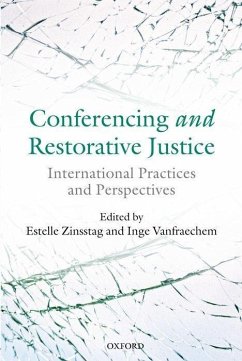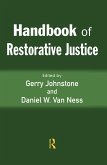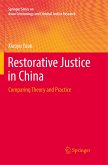Conferencing and Restorative Justice
International Practices and Perspectives
Herausgeber: Zinsstag, Estelle; Vanfraechem, Inge
Conferencing and Restorative Justice
International Practices and Perspectives
Herausgeber: Zinsstag, Estelle; Vanfraechem, Inge
- Gebundenes Buch
- Merkliste
- Auf die Merkliste
- Bewerten Bewerten
- Teilen
- Produkt teilen
- Produkterinnerung
- Produkterinnerung
With contributions from some of the leading figures in the restorative justice community, both practitioners and academics, this book offers an analysis of conferencing practices around the world, examining the range of approaches to different types of crimes and offender age groups, and assessing their outcomes.
Andere Kunden interessierten sich auch für
![Environmental Crime and Restorative Justice Environmental Crime and Restorative Justice]() Mark HamiltonEnvironmental Crime and Restorative Justice149,79 €
Mark HamiltonEnvironmental Crime and Restorative Justice149,79 €![Environmental Crime and Restorative Justice Environmental Crime and Restorative Justice]() Mark HamiltonEnvironmental Crime and Restorative Justice108,99 €
Mark HamiltonEnvironmental Crime and Restorative Justice108,99 €![Handbook of Restorative Justice Handbook of Restorative Justice]() Handbook of Restorative Justice197,99 €
Handbook of Restorative Justice197,99 €![The Psychology of Restorative Justice The Psychology of Restorative Justice]() The Psychology of Restorative Justice197,99 €
The Psychology of Restorative Justice197,99 €![A Suitable Amount of Crime A Suitable Amount of Crime]() Nils ChristieA Suitable Amount of Crime59,99 €
Nils ChristieA Suitable Amount of Crime59,99 €![Restorative Justice, Self-interest and Responsible Citizenship Restorative Justice, Self-interest and Responsible Citizenship]() Lode WalgraveRestorative Justice, Self-interest and Responsible Citizenship79,99 €
Lode WalgraveRestorative Justice, Self-interest and Responsible Citizenship79,99 €![Restorative Justice in China Restorative Justice in China]() Xiaoyu YuanRestorative Justice in China77,99 €
Xiaoyu YuanRestorative Justice in China77,99 €-
-
-
With contributions from some of the leading figures in the restorative justice community, both practitioners and academics, this book offers an analysis of conferencing practices around the world, examining the range of approaches to different types of crimes and offender age groups, and assessing their outcomes.
Hinweis: Dieser Artikel kann nur an eine deutsche Lieferadresse ausgeliefert werden.
Hinweis: Dieser Artikel kann nur an eine deutsche Lieferadresse ausgeliefert werden.
Produktdetails
- Produktdetails
- Verlag: Oxford University Press
- Seitenzahl: 266
- Erscheinungstermin: 20. Januar 2013
- Englisch
- Abmessung: 234mm x 155mm x 23mm
- Gewicht: 567g
- ISBN-13: 9780199655038
- ISBN-10: 0199655030
- Artikelnr.: 47866906
- Herstellerkennzeichnung
- Libri GmbH
- Europaallee 1
- 36244 Bad Hersfeld
- gpsr@libri.de
- Verlag: Oxford University Press
- Seitenzahl: 266
- Erscheinungstermin: 20. Januar 2013
- Englisch
- Abmessung: 234mm x 155mm x 23mm
- Gewicht: 567g
- ISBN-13: 9780199655038
- ISBN-10: 0199655030
- Artikelnr.: 47866906
- Herstellerkennzeichnung
- Libri GmbH
- Europaallee 1
- 36244 Bad Hersfeld
- gpsr@libri.de
Estelle Zinsstag is a senior researcher working on the European FP7 research project ALTERNATIVE. She has joined the Leuven Institute of Criminology in 2008 first as an affiliate, and then as a project officer for the European Forum for Restorative Justice to lead a 2 year research project funded by the European Commission and entitled 'Conferencing: a way forward for restorative justice in Europe', which ended in 2011. She publishes in the areas of sexual violence, transitional justice and restorative justice. Inge Vanfraechem is project manager at the Leuven Institute of Criminology (KU Leuven, Belgium) of the European FP7 project ALTERNATIVE, which concerns security and restorative justice in intercultural settings. Previously, she has worked as a researcher at the National Institute of Criminal Sciences and Criminology (Ministry of Justice, Belgium) on the evaluation of national victim policy, and as a project coordinator with the European Forum for Restorative Justice on Victims and restorative justice. She publishes on restorative justice and victimology.
* 1: Inge Vanfraechem and Estelle Zinsstag: Conferencing: Setting the
scene
* Part 1: Conferencing: Broadening the scope of restorative justice
* 2: Estelle Zinsstag: Conferencing: A developing restorative justice
practice
* 3: Lode Walgrave: The need for clarity about restorative justice
conferences
* 4: Joanna Shapland: Comparing conferencing and mediation: Some
evaluation results internationally
* 5: Tim Chapman: 'That's how the light gets in': Facilitating
restorative conferences
* 6: Heather Strang: Conferencing and victims
* Part 2: Conferencing: Inception, challenges, and newer developments
* 7: Ashley Shearar and Gabrielle Maxwell: Revolution, decline, and
renewal: Restorative youth justice in New Zealand
* 8: Kathleen Daly: Conferences and gendered violence: Practices,
politics, and evidence
* 9: Joan Pennell and Elizabeth Beck: Decentralization and
privatization: The promise and challenges of restorative justice in
the United States
* 10: Daniela Bolivar, Leoberto Brancher, Ivan Navarro, and Manyori
Vega: Conferencing in South America as an exercise of democracy? An
exploration of the 'vertical' role of restorative justice
* Part 3: Conferencing: European perspectives
* 11: Estelle Zinsstag and Tim Chapman: Conferencing in Northern
Ireland: Implementing restorative justice at the core of the criminal
justice system
* 12: Inge Vanfraechem, Katrien Lauwaert, and Melanie Decocq:
Conferencing at the crossroads between rehabilitation and restorative
justice
* 13: Anna Eriksson: Restorative justice in the welfare state:
Conferencing in the Nordic countries
* 14: Rob Van Pagée, Jan Van Lieshout, and Annemieke Wolthuis: Most
things look better when arranged in a circle - Family Group
Conferencing empowers societal developments in The Netherlands
* 15: Ivo Aertsen: Conferencing: Conclusions and way forward
scene
* Part 1: Conferencing: Broadening the scope of restorative justice
* 2: Estelle Zinsstag: Conferencing: A developing restorative justice
practice
* 3: Lode Walgrave: The need for clarity about restorative justice
conferences
* 4: Joanna Shapland: Comparing conferencing and mediation: Some
evaluation results internationally
* 5: Tim Chapman: 'That's how the light gets in': Facilitating
restorative conferences
* 6: Heather Strang: Conferencing and victims
* Part 2: Conferencing: Inception, challenges, and newer developments
* 7: Ashley Shearar and Gabrielle Maxwell: Revolution, decline, and
renewal: Restorative youth justice in New Zealand
* 8: Kathleen Daly: Conferences and gendered violence: Practices,
politics, and evidence
* 9: Joan Pennell and Elizabeth Beck: Decentralization and
privatization: The promise and challenges of restorative justice in
the United States
* 10: Daniela Bolivar, Leoberto Brancher, Ivan Navarro, and Manyori
Vega: Conferencing in South America as an exercise of democracy? An
exploration of the 'vertical' role of restorative justice
* Part 3: Conferencing: European perspectives
* 11: Estelle Zinsstag and Tim Chapman: Conferencing in Northern
Ireland: Implementing restorative justice at the core of the criminal
justice system
* 12: Inge Vanfraechem, Katrien Lauwaert, and Melanie Decocq:
Conferencing at the crossroads between rehabilitation and restorative
justice
* 13: Anna Eriksson: Restorative justice in the welfare state:
Conferencing in the Nordic countries
* 14: Rob Van Pagée, Jan Van Lieshout, and Annemieke Wolthuis: Most
things look better when arranged in a circle - Family Group
Conferencing empowers societal developments in The Netherlands
* 15: Ivo Aertsen: Conferencing: Conclusions and way forward
* 1: Inge Vanfraechem and Estelle Zinsstag: Conferencing: Setting the
scene
* Part 1: Conferencing: Broadening the scope of restorative justice
* 2: Estelle Zinsstag: Conferencing: A developing restorative justice
practice
* 3: Lode Walgrave: The need for clarity about restorative justice
conferences
* 4: Joanna Shapland: Comparing conferencing and mediation: Some
evaluation results internationally
* 5: Tim Chapman: 'That's how the light gets in': Facilitating
restorative conferences
* 6: Heather Strang: Conferencing and victims
* Part 2: Conferencing: Inception, challenges, and newer developments
* 7: Ashley Shearar and Gabrielle Maxwell: Revolution, decline, and
renewal: Restorative youth justice in New Zealand
* 8: Kathleen Daly: Conferences and gendered violence: Practices,
politics, and evidence
* 9: Joan Pennell and Elizabeth Beck: Decentralization and
privatization: The promise and challenges of restorative justice in
the United States
* 10: Daniela Bolivar, Leoberto Brancher, Ivan Navarro, and Manyori
Vega: Conferencing in South America as an exercise of democracy? An
exploration of the 'vertical' role of restorative justice
* Part 3: Conferencing: European perspectives
* 11: Estelle Zinsstag and Tim Chapman: Conferencing in Northern
Ireland: Implementing restorative justice at the core of the criminal
justice system
* 12: Inge Vanfraechem, Katrien Lauwaert, and Melanie Decocq:
Conferencing at the crossroads between rehabilitation and restorative
justice
* 13: Anna Eriksson: Restorative justice in the welfare state:
Conferencing in the Nordic countries
* 14: Rob Van Pagée, Jan Van Lieshout, and Annemieke Wolthuis: Most
things look better when arranged in a circle - Family Group
Conferencing empowers societal developments in The Netherlands
* 15: Ivo Aertsen: Conferencing: Conclusions and way forward
scene
* Part 1: Conferencing: Broadening the scope of restorative justice
* 2: Estelle Zinsstag: Conferencing: A developing restorative justice
practice
* 3: Lode Walgrave: The need for clarity about restorative justice
conferences
* 4: Joanna Shapland: Comparing conferencing and mediation: Some
evaluation results internationally
* 5: Tim Chapman: 'That's how the light gets in': Facilitating
restorative conferences
* 6: Heather Strang: Conferencing and victims
* Part 2: Conferencing: Inception, challenges, and newer developments
* 7: Ashley Shearar and Gabrielle Maxwell: Revolution, decline, and
renewal: Restorative youth justice in New Zealand
* 8: Kathleen Daly: Conferences and gendered violence: Practices,
politics, and evidence
* 9: Joan Pennell and Elizabeth Beck: Decentralization and
privatization: The promise and challenges of restorative justice in
the United States
* 10: Daniela Bolivar, Leoberto Brancher, Ivan Navarro, and Manyori
Vega: Conferencing in South America as an exercise of democracy? An
exploration of the 'vertical' role of restorative justice
* Part 3: Conferencing: European perspectives
* 11: Estelle Zinsstag and Tim Chapman: Conferencing in Northern
Ireland: Implementing restorative justice at the core of the criminal
justice system
* 12: Inge Vanfraechem, Katrien Lauwaert, and Melanie Decocq:
Conferencing at the crossroads between rehabilitation and restorative
justice
* 13: Anna Eriksson: Restorative justice in the welfare state:
Conferencing in the Nordic countries
* 14: Rob Van Pagée, Jan Van Lieshout, and Annemieke Wolthuis: Most
things look better when arranged in a circle - Family Group
Conferencing empowers societal developments in The Netherlands
* 15: Ivo Aertsen: Conferencing: Conclusions and way forward








